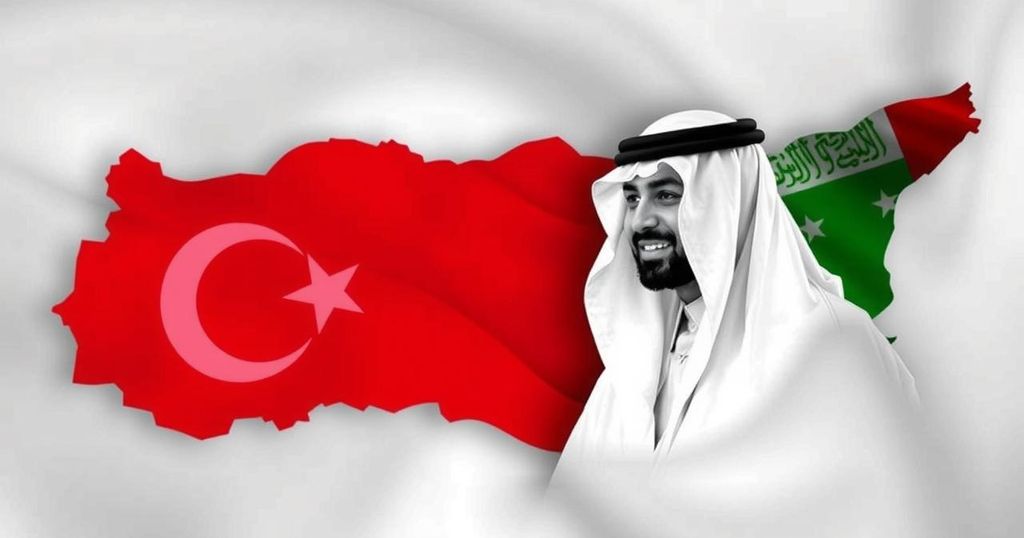Turkey is seeking support from Saudi Arabia and the UAE to ensure a stable and neutral Syrian government following Bashar al-Assad’s regime collapse. Turkish officials emphasize the need for regional cooperation to prevent Iranian and Turkish dominance, while enhancing constructive dialogue with Gulf nations to facilitate Syria’s reconstruction efforts. Russian involvement complicates the dynamics, as Ankara aims for a multi-actor approach to stabilizing the region.
In light of the recent upheaval following the swift destabilization of Bashar al-Assad’s regime in Syria, Turkey is proactively seeking the support of key Gulf nations, particularly Saudi Arabia and the United Arab Emirates (UAE). Turkish officials express reticence following the tumult of the Arab Spring and endeavor to ensure that their interventions contribute positively to Syria’s future governance structure. President Recep Tayyip Erdogan aims to cultivate relations with the Gulf to garner their long-term backing amid local geopolitical complexities.
Erdogan is slated to partake in an upcoming Cairo summit with Egyptian President Abdel Fattah el-Sisi, where matters regarding a prospective Syrian government will be addressed, particularly regarding the presence of the Hay’at Tahrir al-Sham (HTS), a group with historical ties to al-Qaeda that has gained prominence within Syria. While Turkey has historically distanced itself from endorsing HTS publicly, Turkish Foreign Minister Hakan Fidan acknowledged last week, “No one knows this group better than Turkey,” elucidating Turkey’s nuanced position in the region.
Turkey’s strategic vision extends to advocating for a neutral Syrian state that does not threaten neighboring countries, seeking, in particular, to mitigate Iranian influence while avoiding Turkish hegemony as well. Fidan emphasized the importance of cooperation among regional players—Saudi Arabia, UAE, and Qatar included—stating, “We do not want Iranian domination in the region, nor do we want Turkish domination.” This cooperative stance aims to stabilize Syria further and protect regional order against external interference.
Turkey’s evolving dialogue with the UAE is noteworthy as it has influenced Gulf perspectives on Syria. Recognizing the necessity of reconstruction funding, Turkish officials have engaged with international entities, including the EU. European Commission President Ursula von der Leyen recently announced increased EU involvement in Syrian recovery efforts, pledging humanitarian support. However, the dynamics involving Russia complicate the reconstruction discourse, given its military entrenchment and historical backing of the Assad regime.
The complex political landscape of Syria has garnered international attention, especially following the disintegration of Bashar al-Assad’s government. Turkey has been maneuvering to position itself advantageously in these developments while learning from past missteps during the Arab Spring. The country recognizes the need for partnerships with regional powers and international allies to facilitate reconstruction and ensure stability, as millions of Syrians depend on these political outcomes for their future security and governance. Engagement with Gulf nations reflects a strategic approach to achieve both immediate stabilization goals and long-term sustainable peace in Syria.
In summary, Turkey is actively seeking to build alliances with Saudi Arabia and the UAE to ensure a constructive role in Syria’s future governance, emphasizing neutrality and regional cooperation. The outreach highlights Turkey’s commitment to avoiding historical pitfalls while addressing critical security concerns, particularly the influence of Iranian and extremist entities. However, Turkey’s aspirations for a rebuilt Syria are tethered to the complex geopolitical interplay involving Russia, necessitating a multifaceted diplomatic strategy moving forward.
Original Source: www.middleeasteye.net







